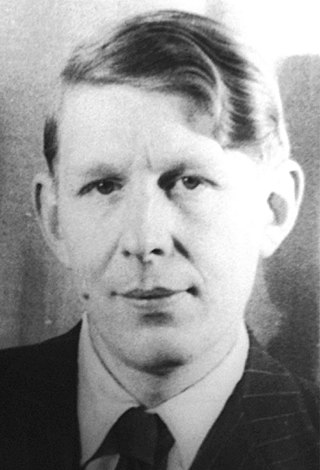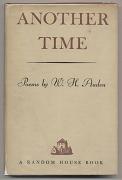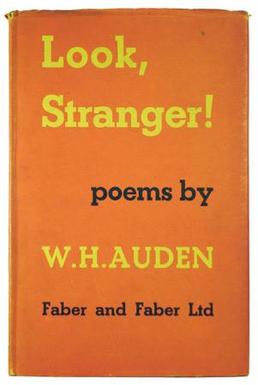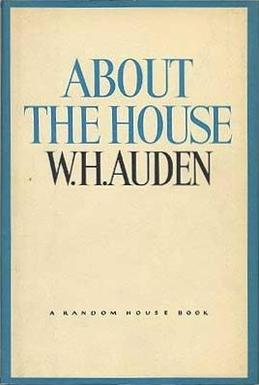
Wystan Hugh Auden was a British-American poet. Auden's poetry was noted for its stylistic and technical achievement, its engagement with politics, morals, love, and religion, and its variety in tone, form, and content. Some of his best known poems are about love, such as "Funeral Blues"; on political and social themes, such as "September 1, 1939" and "The Shield of Achilles"; on cultural and psychological themes, such as The Age of Anxiety; and on religious themes such as "For the Time Being" and "Horae Canonicae".
Michael Roberts, originally named William Edward Roberts, was an English poet, writer, scientist, mathematician, critic and broadcaster, a true polymath who made his living as a teacher.

Frederick Louis MacNeice was an Irish poet and playwright, and a member of the Auden Group, which also included W. H. Auden, Stephen Spender and Cecil Day-Lewis. MacNeice's body of work was widely appreciated by the public during his lifetime, due in part to his relaxed but socially and emotionally aware style. Never as overtly or simplistically political as some of his contemporaries, he expressed a humane opposition to totalitarianism as well as an acute awareness of his roots.

"Musée des Beaux Arts" is a poem written by W. H. Auden in December 1938 while he was staying in Brussels, Belgium, with Christopher Isherwood. It was first published under the title "Palais des beaux arts" in the Spring 1939 issue of New Writing, a modernist magazine edited by John Lehmann. It next appeared in the collected volume of verse Another Time, which was followed four months later by the English edition. The poem's title derives from the Musées Royaux des Beaux-Arts de Belgique, the French-language name for the Royal Museums of Fine Arts of Belgium located in Brussels. The museum is famous for its collection of Early Netherlandish painting. When Auden visited the museum he would have seen a number of the paintings of the "Old Masters" referred to in the second line of the poem, including the Fall of Icarus which at the time was still regarded as an original by Pieter Bruegel the Elder.
Edward Mendelson is a professor of English and Comparative Literature and the Lionel Trilling Professor in the Humanities at Columbia University. He is the literary executor of the Estate of W. H. Auden and the author or editor of several books about Auden's work, including Early Auden (1981) and Later Auden (1999). He is also the author of The Things That Matter: What Seven Classic Novels Have to Say About the Stages of Life (2006), about nineteenth- and twentieth-century novels, and Moral Agents: Eight Twentieth-Century American Writers (2015).
"Funeral Blues", or "Stop all the clocks", is a poem by W. H. Auden which first appeared in the 1936 play The Ascent of F6. Auden substantially rewrote the poem several years later as a cabaret song for the singer Hedli Anderson. Both versions were set to music by the composer Benjamin Britten. The second version was first published in 1938 and was titled "Funeral Blues" in Auden's 1940 Another Time. The poem experienced renewed popularity after being read in the film Four Weddings and a Funeral (1994), which also led to increased attention on Auden's other work. It has since been cited as one of the most popular modern poems in the United Kingdom.

Poems is the title of three separate collections of the early poetry of W. H. Auden. Auden refused to title his early work because he wanted the reader to confront the poetry itself. Consequently, his first book was called simply Poems when it was printed by his friend and fellow poet Stephen Spender in 1928; he used the same title for the very different book published by Faber and Faber in 1930, and by Random House in 1934, which also included The Orators and The Dance of Death.

Spain is a poem by W. H. Auden written after his visit to the Spanish Civil War. Spain was described by George Orwell as "one of the few decent things that have been written about the Spanish war". It was written and published in 1937. Auden donated all the profits from the sale of Spain to the Spanish Medical Aid Committee.

Letters from Iceland is a travel book in prose and verse by W. H. Auden and Louis MacNeice, published in 1937.

Journey to a War is a travel book in prose and verse by W. H. Auden and Christopher Isherwood, published in 1939.

Another Time is a book of poems by W. H. Auden, published in 1940.

On This Island is a book of poems by W. H. Auden, first published under the title Look, Stranger! in the UK in 1936, then published under Auden's preferred title, On this Island, in the US in 1937. It is also the title of one of the poems in the collection.
"The Sea and the Mirror: A Commentary on Shakespeare's The Tempest" is a long poem by W.H. Auden, written 1942–44, and first published in 1944. Auden regarded the work as “my Ars Poetica, in the same way I believe The Tempest to have been Shakespeare’s.”

About the House is a book of poems by W. H. Auden, published in 1965 by Random House.

City Without Walls and other poems is a book by W. H. Auden, published in 1969.

Thank You, Fog: Last Poems by W. H. Auden is a posthumous book of poems by W. H. Auden, published in 1974.
This is a bibliography of books, plays, films, and libretti written, edited, or translated by the Anglo-American poet W. H. Auden (1907–1973). See the main entry for a list of biographical and critical studies and external links.

The Earth Compels was the second poetry collection by Louis MacNeice. It was published by Faber and Faber on 28 April 1938, and was one of four books by Louis MacNeice to appear in 1938, along with I Crossed the Minch, Modern Poetry: A Personal Essay and Zoo.
"Epilogue For W. H. Auden" is a 76-line poem by Louis MacNeice. It was written in late 1936 and was first published in book form in Letters from Iceland, a travel book in prose and verse by W. H. Auden and Louis MacNeice (1937). MacNeice subsequently included it as the last poem in his poetry collection The Earth Compels (1938). "Epilogue For W. H. Auden" reviews the Iceland trip MacNeice and Auden had taken together in the summer of 1936; the poem mentions events that had occurred while MacNeice and Auden were in Iceland, such as the fall of Seville and the Olympic Games in Berlin.
Bucolics is a sequence of poems by W. H. Auden written in 1952 and 1953. The seven poems in the sequence are: "Winds", "Woods, "Mountains", "Lakes", "Islands", "Plains", and "Streams".












